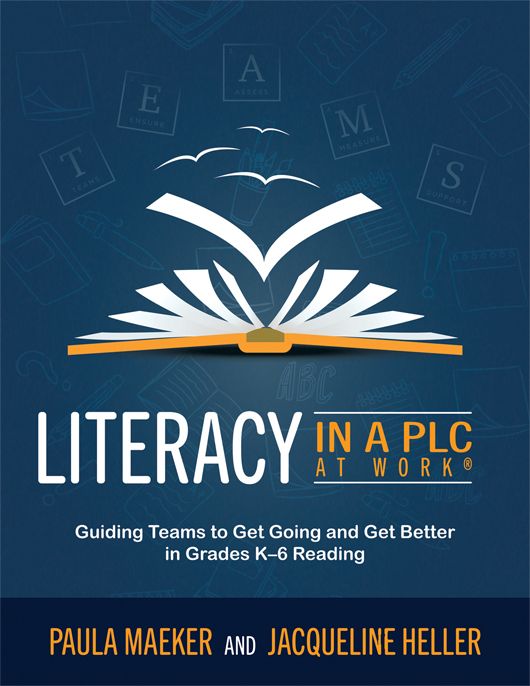Free Reproducibles
Literacy in a PLC at Work®
Authors Paula Maeker and Jacqueline Heller are practitioners who share the belief that all students can be literate at high levels. Explore their practical, research-affirmed framework for how teams can better sustain change and improve as literacy educators.
Benefits
- Analyze and improve their current literacy practices, curriculum, and instructional focus within the context of a PLC at Work
- Create or curate common formative team literacy assessments for learning targets
- Structure a supportive master schedule that allows for daily team collaboration and systemwide response
- Understand the components of a comprehensive literacy instructional block
- Create progress-monitoring tools and focused reading interventions and extensions
TABLE OF CONTENTS
Introduction
Chapter 1: Teams Take Collective Responsibility and Work Interdependently
Chapter 2: Ensure a Guaranteed and Viable Curriculum
Chapter 3: Assess and Monitor Student Reading Achievement With Ongoing Assessment
Chapter 4: Measure Effectiveness of Individual and Collective Teacher Practices
Chapter 5: Support Systematically With Targeted Acceleration, Interventions, and Extensions
Afterword
Appendix A
Appendix B
PRINTABLE REPRODUCIBLES
Chapter 1
Chapter 2
- Critical Components of Reading: Questions for Literacy Teams to Consider
- Figure 2.4: Literacy Team Standards
- Get Going on Chapter 2: Ensure a Guaranteed and Viable Curriculum
Chapter 3
- Figure 3.3: Assessment Options for Consideration Form
- Figure 3.10: Large Goal Progress-Monitoring Tracker
- Figure 3.11: Fiction-Unit Learning Target Mastery Checklist
- Figure 3.12: Learning Goal Student Data Tracker
- Figure 3.13: Kindergarten Goal Card
- Figure 3.14: Goal Card With Tally Marks
- Get Going on Chapter 3: Assess and Monitor Student Reading Achievement With Ongoing Assessment
Chapter 4
- Critical Considerations for Analyzing Evidence of Professional Effectiveness
- Figure 4.5: Retelling Graph
- Figure 4.6: Detail Dots Tool
- Figure 4.7: Sequencing Stories Game Board
- Get Going on Chapter 4: Measure Effectiveness of Individual and Collective Teacher Practices
Chapter 5
- Figure 5.7: Purchased Curricula Alignment Tool
- Get Going on Chapter 5: Support Systematically With Targeted Acceleration, Interventions, and Extensions
Appendix A
- TEAMS Process Protocol for Deconstructing Essential Standards
- TEAMS Process Protocol for Building Common Formative Assessments
- TEAMS Process Protocol for Analyzing Data for Evidence of Instructional Effectiveness
- TEAMS Process Protocol for Monitoring Intervention Progress
Appendix B
- TEAMS Process Template: Deconstructing Essential Standards
- Deconstructing and Reconstructing Essential Learning Targets: Critical Question One (Know)
- Building an Assessment Plan by Learning Target: Critical Question Two (Show)
- TEAMS Process Template: Building Common Formative Assessments
- TEAMS Process Template: Analyzing Data for Evidence of Instructional Effectiveness
- Path to Proficiency Plan Template
- Targeted Intervention Groups and Goals Template
- Systematically Communicating and Collaborating About Learning in Interventions
- Building a Response Plan by Learning Target: Critical Question Three (Grow)
- Building a Response Plan by Learning Target: Critical Question Four (Glow)
SUGGESTED RESOURCES
BOOKS
- Buffum, A., Mattos, M., & Malone, J. (2018). Taking action: A handbook for RTI at Work. Bloomington, IN: Solution Tree Press.
- Buffum, A., Mattos, M., & Weber, C. (2012). Simplifying response to intervention: Four essential guiding principles. Bloomington, IN: Solution Tree Press.
- Conzemius, A. E., & O’Neill, J. (2014). The handbook for SMART school teams: Revitalizing best practices for collaboration (2nd ed.). Bloomington, IN: Solution Tree Press.
- Dimich, N. (2015). Design in five: Essential phases to create engaging assessment practice. Bloomington, IN: Solution Tree Press.
- DuFour, R. (2015). In praise of American educators: And how they can become even better. Bloomington, IN: Solution Tree Press.
- DuFour, R., DuFour, R., Eaker, R., Many, T. W., & Mattos, M. (2016). Learning by doing: A handbook for Professional Learning Communities at Work (3rd ed.). Bloomington, IN: Solution Tree Press.
- DuFour, R., & Marzano, R. J. (2011). Leaders of learning: How district, school, and classroom leaders improve student achievement. Bloomington, IN: Solution Tree Press.
- Eaker, R., Hagadone, M., Keating, J., & Rhoades, M. (2021). Leading PLCs at Work districtwide: From boardroom to classroom. Bloomington, IN: Solution Tree Press.
- Jenkins, K. (2003). The potato chip man and other stories. Bloomington, IN: Xlibris.
- Kerr, D., Hulen, T. A., Heller, J., & Butler, B. K. (2021). What about us? The PLC at Work process for preK–2 teams. Bloomington, IN: Solution Tree Press.
- Kramer, S. V., & Schuhl, S. (2017). School improvement for all: A how-to guide for doing the right work. Bloomington, IN: Solution Tree Press.
- Marzano, R. J. (2018). Making classroom assessments reliable and valid. Bloomington, IN: Solution Tree Press.
- Marzano, R. J., Yanoski, D. C., Hoegh, J. K., & Simms, J. A. (2013). Using Common Core standards to enhance classroom instruction and assessment. Bloomington, IN: Marzano Resources.
- White, K. (2022). Student self-assessment: Data notebooks, portfolios, and other tools to advance learning. Bloomington, IN: Solution Tree Press.

